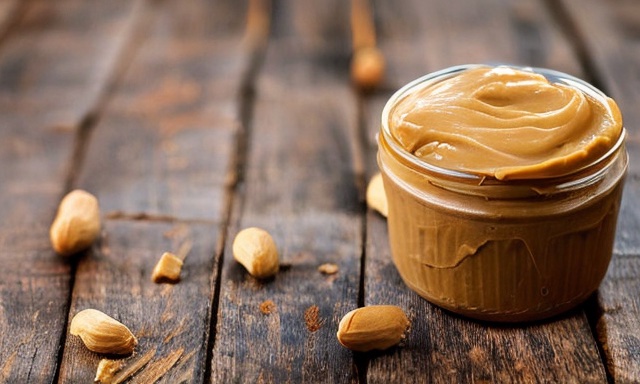Internet Asks: “Does Peanut Butter Cause Heartburn?”
Peanut butter, a beloved staple in many households, is a versatile spread that can elevate the flavor of sandwiches, snacks, and even desserts. But for some, there's a lingering concern: does peanut butter cause heartburn? Let's spread the truth about this nutty delight and uncover whether it truly deserves its bad rap.
sponsored links

The Heartburn Hype
Before we delve into the peanut butter debate, let's quickly understand what heartburn is.
Heartburn, characterized by a burning sensation in the chest, is often attributed to the reflux of stomach acid into the esophagus. While certain foods and lifestyle factors can trigger heartburn, peanut butter has been mistakenly labeled as a culprit. However, the reality might surprise you!
Peanut Butter's Innocence
- High Fat Content:
Peanut butter is known for its rich, creamy texture, thanks to its healthy fat content. While fats can contribute to heartburn for some individuals, the fat content in peanut butter is typically moderate. Therefore, unless you have a specific sensitivity to dietary fats, peanut butter alone is unlikely to be a direct cause of heartburn. - Acidic Nature:
Contrary to popular belief, peanuts and peanut butter are not highly acidic foods. They fall within a neutral to slightly alkaline range on the pH scale. Thus, the acidity of peanut butter is unlikely to be a significant trigger for heartburn.
Managing Heartburn Triggers
Although peanut butter itself doesn't cause heartburn, it's important to consider other factors that can contribute to this uncomfortable condition. Here are a few tips for managing heartburn triggers:
- Portion Control:
While peanut butter itself is not problematic, consuming large quantities in one sitting may increase the risk of heartburn. Be mindful of your portion sizes and enjoy peanut butter in moderation. - Pairing with Heartburn-Friendly Foods:
If you're prone to heartburn, consider pairing peanut butter with heartburn-friendly foods. For example, enjoy it on whole-grain bread or with sliced apples, which can help balance the acidity and provide additional fiber. - Lifestyle Modifications:
Lifestyle factors such as overeating, consuming spicy or fatty foods, and lying down immediately after eating can contribute to heartburn. Make sure to maintain a balanced diet, practice portion control, and allow sufficient time for digestion before lying down.
sponsored links
Nutritional Benefits of Peanut Butter
Beyond its potential heartburn innocence, peanut butter offers a host of nutritional benefits that make it a valuable addition to your diet:
- Healthy Fats:
Peanut butter is a great source of monounsaturated fats, which can promote heart health and help maintain healthy cholesterol levels when consumed in moderation. - Protein Powerhouse:
Packed with plant-based protein, peanut butter provides a satisfying and nourishing boost to your meals and snacks. Protein is essential for tissue repair, muscle growth, and overall energy. - Vitamins and Minerals:
Peanut butter is rich in essential vitamins and minerals, including vitamin E, niacin, magnesium, and potassium. These nutrients play vital roles in various bodily functions and support overall health and well-being.
Conclusion
While peanut butter alone is unlikely to cause heartburn for most individuals, personal triggers and portion sizes can play a role. If you experience heartburn symptoms, it may be worth evaluating your overall diet and lifestyle to identify potential triggers. Remember, everyone's body is unique, so what causes heartburn for one person may not affect another. So go ahead, spread that peanut butter joyfully, but always listen to your body and make choices that work best for you.
Disclaimer: The information provided in this article is for educational and informational purposes only. It is not intended as a substitute for professional medical advice, diagnosis, or treatment. Always seek the advice of your physician or other qualified health providers with any questions you may have regarding a medical condition. Individual experiences with heartburn may vary, and it's essential to consult with a healthcare professional for personalized guidance.
sponsored links
References
- USDA. Peanut butter, creamy. https://fdc.nal.usda.gov/fdc-app.html#/food-details/2262072/nutrients
- Mayo Clinic. Healthcare expert offers tips for holiday feasting without the heartburn. https://newsnetwork.mayoclinic.org/discussion/mayo-clinic-healthcare-expert-offers-tips-for-holiday-feasting-without-the-heartburn/
- Harvard Health Publishing. What to eat when you have chronic heartburn. https://www.health.harvard.edu/diseases-and-conditions/what-to-eat-when-you-have-chronic-heartburn
- Mayo Clinic. Heartburn. https://www.mayoclinic.org/diseases-conditions/heartburn/symptoms-causes/syc-20373223
- Pendulum. What Kind of Peanut Butter Is Good for GERD?. https://www.pendulum.org/what-kind-of-peanut-butter-is-good-for-gerd/
People are also reading...
Carbs In Guacamole?
Calories in a Grilled Cheese?
🍍 Are Mangoes Acidic?
Ready to level-up?
Create meal plans 10x faster, follow up with your clients through our mobile app, and never struggle with meal planning or recipe management again.